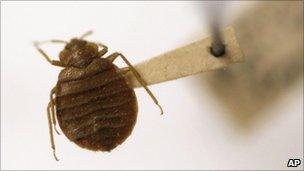Bedbugs bite into the US economy
- Published

In popular culture, New York is the city that never sleeps, the concrete jungle in which dreams are made, a place to walk on the wild side.
The reality is the US financial capital is, above all, a crowded and bustling pool of humanity, in which about nine million people live and work cheek by jowl.
Such proximity makes it the perfect breeding ground for a creature that certainly causes its residents to lose sleep, and for many is the stuff of nightmares.
For the past few summers, New York has been struggling with an epidemic of bedbugs - tiny bloodsucking insects that hide during the day, but come out to feed at night.
An infestation of bedbugs is very easy to acquire, and very difficult to eradicate. They can be picked up in taxis or cinemas, on subway trains or in hotel rooms.
Last year, some of the city's flagship retailers were affected. Lingerie retailer Victoria's Secret and teen fashion store Hollister were among those that had to close outlets while pest controllers were called in.
'PR nightmare'
For businesses, finding bedbugs can be very bad news indeed.
Getting rid of them can be very expensive, with treatment of commercial premises sometimes costing tens of thousands of dollars.
But damage to reputations can be even harder to rectify, according to Scott Bermack of New York legal firm LeClair Ryan.
"It's a public relations nightmare," he says. "There's a perception among the public that one bug is an infestation.
"You hear about one bug in a store or a hotel and the customers are going to run out and tell their friends and tell all the websites."
Disgruntled customers are also likely to take legal action. When bedbugs are found, says Mr Bermack, the writs soon follow.
"You have people suing for damage to furniture, damage to clothing. You have people suing for pain and suffering, for emotional damages or psychological damages.
"There's really no limit to the creativity of the plaintiffs' lawyers in terms of the claims they'll make."
Because companies are anxious to limit bad publicity, many of these cases are settled out of court - adding thousands of dollars to the bills they already face for getting rid of the bugs.
Cracking down
Lawyers, of course, are making money out of the bedbug epidemic, but they are not the only ones.
"It's been terrific in terms of revenue," says Timothy Wong, director of pest control firm M&M Environmental.
His office in Manhattan's Lower East Side is packed with the bulky equipment needed to eradicate bedbugs, and a pervasive smell of insecticide hangs in the air.
"Six or seven years ago, bedbug-related services made up less than 1% of our total revenue. Today, it's more than 25%," he says.
"We're treating almost everything, from commercial offices to retail stores, hotels, giant department stores, airlines - just about everybody."
His company makes its money not only from getting rid of bedbugs, but also from preventing them getting established in the first place.
Inevitably, the surge in demand for pest control services has prompted many entrepreneurs to try their luck in the market. But according to Mr Wong, few have succeeded.
"There were a lot of new players who came in. In 2010, there were more than 125 new entrants into the market."
"But the funny thing is, 60 or 70% of them have already left. They came into an industry that they're not familiar with. The overheads are huge, the equipment is expensive, and the training is expensive.
"So people jumping into the business thinking they can turn up and cash in… well, it's difficult. And I think they're proving that's the case."
Getting tougher
But for Mr Wong's own company, business is booming - a fact made all too obvious by the row of sales staff crammed into a narrow corridor, taking calls from anxious homeowners and businesses.
It's a line of work that looks unlikely to dry up any time soon.
Insecticides that used to be effective against bedbugs, such as DDT, have been banned, while the insects have steadily become immune to others.
Bedbug activity increases during warm weather, and experts say this summer will be no exception. New York is bracing itself for another irritating onslaught.
But the uncomfortable fact is that, as in so many areas, where New York leads, other cities look set to follow.
Bedbugs are notoriously good travellers, and signs of similar epidemics are already emerging in Philadelphia, Los Angeles, Washington, London and Paris.
Good business for some, sleepless nights for others.
- Published2 February 2011
- Published3 September 2010
- Published27 November 2010
- Published7 October 2010